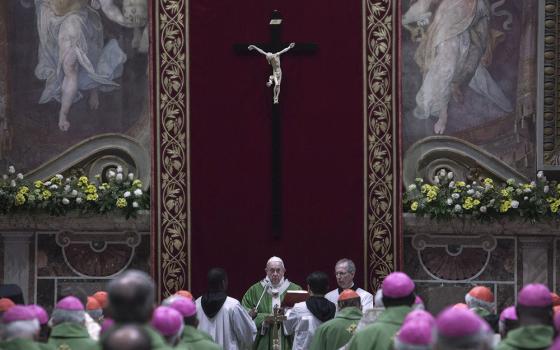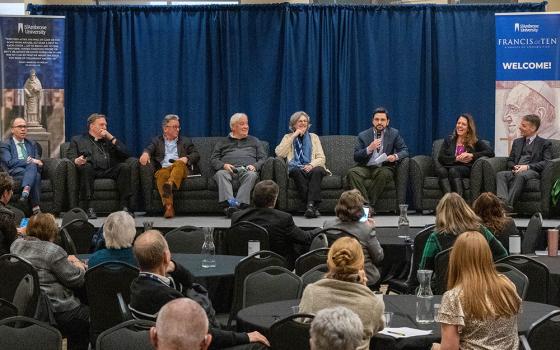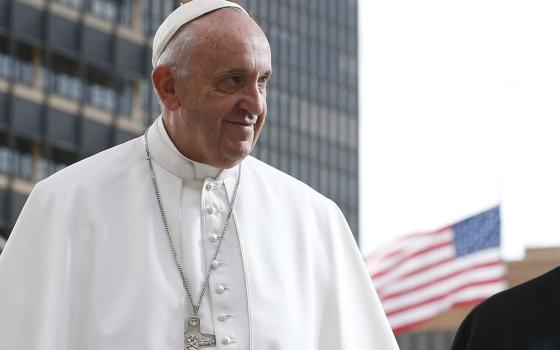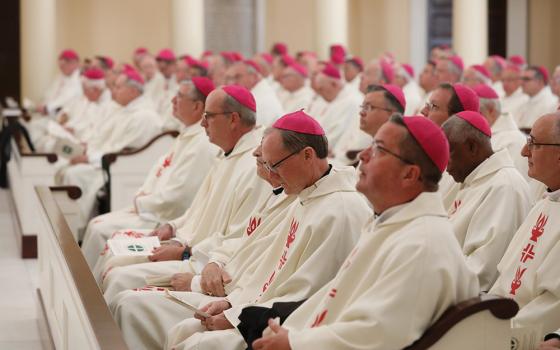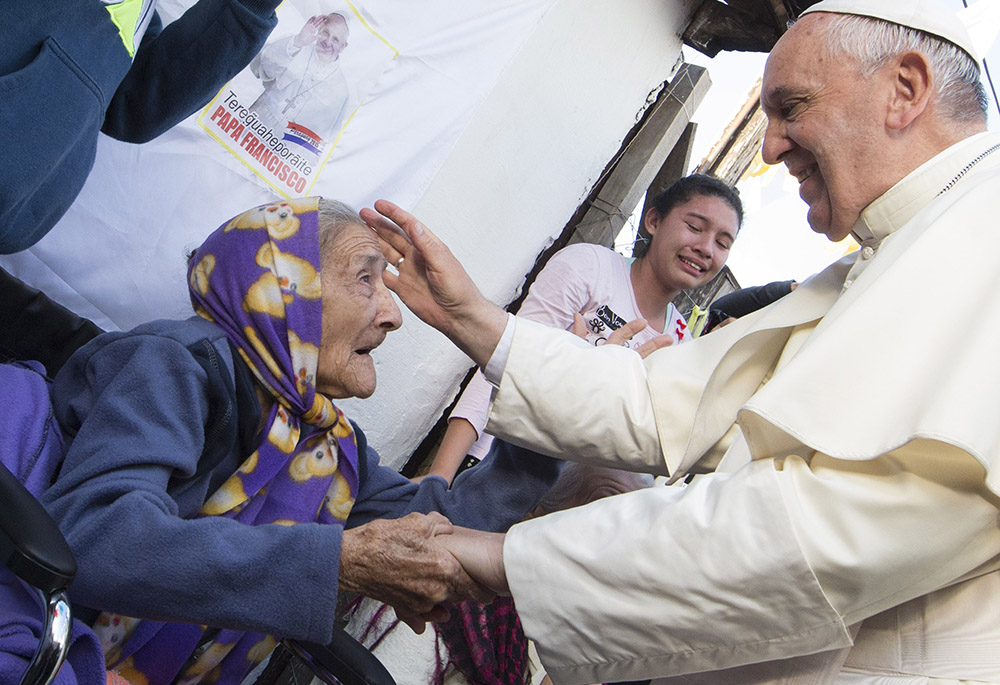
Pope Francis greets an elderly woman as he meets with people in a poor neighborhood in Asuncion, Paraguay, in this July 12, 2015, file photo. (CNS/Paul Haring)
One month from today will mark the 10th anniversary of the election of Pope Francis. In the weeks ahead, I will devote some columns to reflecting on this fascinating decade in papal history. This is not an early obituary. I shall also explain how the past 10 years paint a picture of what we can expect as the Holy Father commences his second decade steering the barque of Peter.
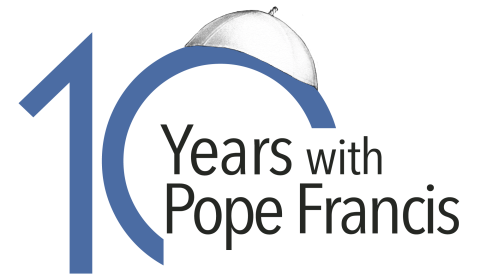
The first thing that distinguishes Pope Francis' approach to the Petrine ministry is his pastoral sensibility. Indeed, this is what distinguished him that first night when he was elected in 2013. After greeting the crowd with a "buona sera" and telling them the cardinals had gone to the "end of the world" to find a new bishop for Rome, he asked the crowd to pray first for his predecessor, Pope Emeritus Benedict. He then led the people in the piazza in the Our Father, the Hail Mary and the Glory Be, prayers that even a child would know. He then asked the people to pray over him, their new bishop, before he imparted the blessing, bowed and let silence engulf the enormous crowd. Then he said the blessing and wished everyone good night.
The next day, we learned he would not be living in the apostolic palace but, instead, at the Domus Sanctae Marthae, a guesthouse for visitors to the Vatican. This was mistakenly taken as an indication of his preference for poverty. The papal apartment in the apostolic palace is, despite the name, not especially sumptuous. The Raphael stanze and the Borgia apartments, which a tourist can visit on a tour of the Vatican museums, those are luxurious, but the papal apartment was workmanlike. It was also remote, and Francis indicated that his move reflected his need to be around people.
Pope Francis caused a stir early in his pontificate when, during a press conference on the papal plane returning from Brazil, he was asked about gay priests. "If someone is gay and he searches for the Lord and has good will, who am I to judge?" Heads exploded! How could a pope say such a thing? Conservative critics expressed "confusion" but the rest of us recognized a pastor more interested in encouraging people than judging them.
Pope Francis preached each morning at the chapel in the Domus, and the Vatican published a synopsis of the texts. The sermons were homey, accessible. There was a density to a Ratzinger sermon, but not to a Bergoglio sermon. That is not to say they were fluff. On the contrary, there is a radicalness to a Bergoglio sermon. He has a knack for getting to the heart of the matter, and doing so in a way that resonates with the person in the pew.
One of my favorite sermons from those early years came on Dec. 15, 2014, when Francis preached on the chief priests questioning Jesus by what authority he taught. At one point, the Holy Father spoke about the character of scrupulosity in every age: "This is the drama of the hypocrisy of this people. And Jesus never negotiates his heart of the Son of the Father, but he was so open to the people, seeking paths to help them. 'But this can't be done; our discipline, our doctrine say this can't be done!’ they say. 'Why do your disciples eat grain in the fields, when they travel, on the day of the Sabbath? It can't be done!' They were so rigid in their discipline: 'No, the discipline can't be touched, it's sacred.' "
Advertisement
He added a point of confession: "And sometimes, I confess something to you, when I have seen a Christian, a Christian of that kind, with a weak heart, not firm, not fixed on the rock — Jesus — and with such rigidness on the outside, I ask the Lord: 'But Lord, throw a banana peel in front of them, so that they will take a good fall, and feel shame that they are sinners, and so encounter you, [and realize] that you are the Saviour.' Many times a sin will make us feel shame, and make us encounter the Lord, who pardons us, as the sick who were there and went to the Lord for healing."
I remember laughing out loud when I sat at my computer, reading about that banana peel!
Sometimes, the pope's pastoral style leaves liberals feeling queasy. Early on in the pontificate, it became obvious that the pope was mentioning the devil more frequently than his post-conciliar predecessors had done. Seeing evil as something personified is not the way most moderns tend to think about evil, but Jesus had no such compunction. Popular piety, especially among those who are truly marginalized, has always expressed the idea that evil is present in a way that suggests a transcendently powerful personification.
We no longer see the Holy Father mixing with crowds the same way he did in the early years. His bum knee makes it harder. But the images of him stopping the popemobile to allow a parent to hand him a child for a blessing, or stepping out of the vehicle to caress a man with a severely disfiguring disease, these images showed someone who engaged the world with the eyes of Jesus. Hard to find a better definition of a pastor than that, engaging people with the eyes of Jesus.
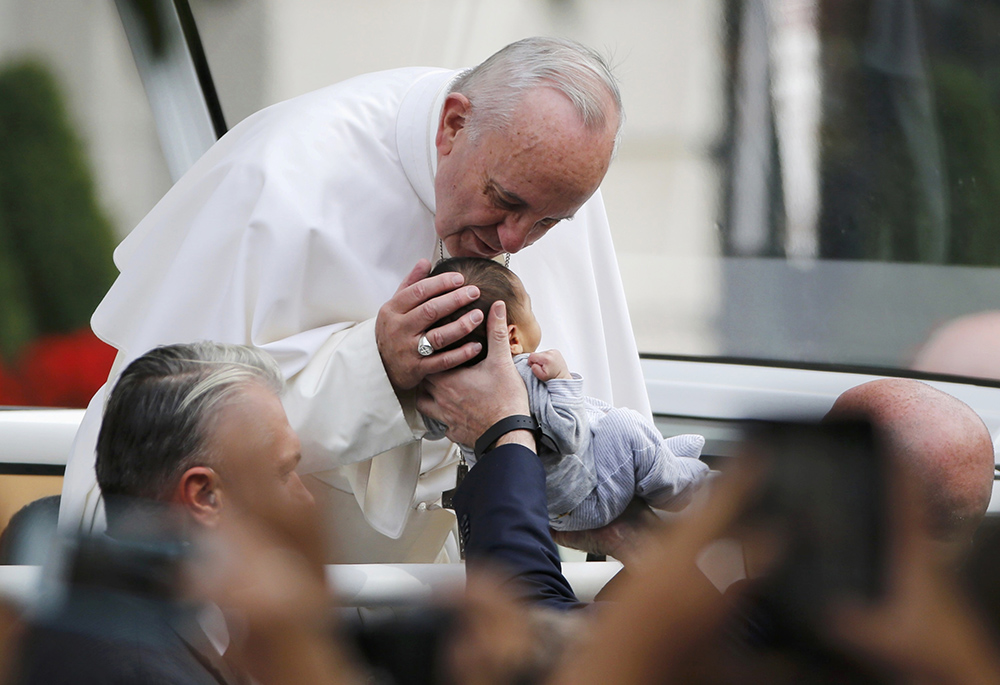
Pope Francis stops to kiss a child as he makes his way in the popemobile to Independence Hall Sept. 26, 2015, in Philadelphia. (CNS/Reuters/Jim Bourg)
It is a remarkable quality of this pope that he only has harsh words for people who are hypocrites and stuffed shirts, better to say, stuffed cassocks. With the people of God, he is generous and sympathetic. With the intrigue of the Roman Curia, not so much.
Injustice, too, earns the pope's ire and that stems not from some lofty commitment to a different social order, but from his experience with extreme poverty, first in slums of Buenos Aires and now in the various worldwide favelas of the world, most recently in Africa. He denounces neoliberal economics not from an economic standpoint but from a human one, from what it does, not its theories. He knows and loves the people who have been kicked to the side of the road after falling in with the robber barons on the road to the neoliberal Jericho. Is it just me or does he seem more at home in the midst of desperately poor people than he does at the airport welcoming ceremonies when he is surrounded by potentates and their handlers?
Through most of the last two centuries, the cardinals elected either diplomats or candidates with pastoral experience as pope. Ironically, the pastors tended to be more reactionary, such as Pius IX and Pius X, and diplomats such as Pius VII, Benedict XV and John XXIII were more pastoral. In our own time, the pastor Pope John Paul II was not reactionary, but he did lend a more conservative interpretation to Vatican II than many of his brother bishops. Benedict XVI had been at a desk in the Vatican Curia for 24 years when he was elected. Francis, a son of Latin America, has been the beneficiary of that continent's reception of Vatican II with its continuing determination to pose the question: What does it mean to exercise a preferential option for the poor? The struggle to answer that question has shaped his pastoral style immensely.
Pastor. It is the first word that comes to mind when we try to understand this papacy. Francis is theologically astute, to be sure, but he is as schooled in pastoral theology as he is in doctrinal or ethical studies. He is not afraid to engage the politicians of the world, but he lacks the discretion of a diplomat. He walks into the world with open arms and the world loves him for it. Pope Francis is the world's parish priest, and that quality grounds and shapes every other aspect of his papacy.





